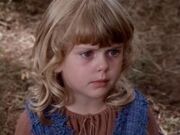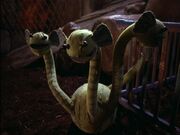The Lernaean Hydra was a monster and the daughter of Typhon and Echidna. She was born before Typhon's 100-year imprisonment[1] and would later fall victim to Hera's influence. When Hercules and Iolaus first encountered this Hydra, it was in the form of a young girl[2].
As a child, she was known for being a good knitter (a feat she probably accomplished in her human state given her real biology)[1] Before she encountered Hercules, she was known for terrorizing the Lyrians.[3]
At some point before her death, the Lernaean Hydra managed to propagate herself, spawning many other hydras.[4]
Battle with Hercules[]

The Hydra in her human form
On the road outside of Corinth, but also near Eubola[5], the Hydra acted as a guardian of Hera's temple. She ate many travelers on that road.
On the way to Alcmene's home, Hercules and Iolaus encountered the Hydra, posing as a little girl. She told Hercules that a monster ate her father and she was afraid the monster would hear her if she didn't whisper. When Hercules came closer to hear the girl, she grabbed him by the neck and began transforming back into her monstrous form.
She emerged one-headed after Hercules freed himself. After knocking Iolaus over, she was quickly beheaded by Hercules. Moments after the beheading, two more heads grew. One more was cut down, growing again to make a total of three heads. It was at this point that Hercules ceased trying to chop her heads off.
Iolaus grabbed the torch off of Hera's temple, as Hercules managed to stab two heads into a tree. The third head was cut off, but partway through regrowing, it was burned by Hercules. The entire Hydra disappeared in flames, revealing a peacock feather signalling Hera's involvement. Hercules destroyed her nearby peacock statue.[2]
Aftermath[]

Obie's stuffed Hydra
Hercules retained a scar on his chest from his battle with the Hydra.[3]
The Hydra was the first known child of Echidna to have been killed by Hercules, causing her to seek vengeance.[6]
When Echidna gave birth to another son, she gave him a stuffed hydra in remembrance of her daughter.[7]
Hercules would later give Xena a similar stuffed hyrda as a gift for the soon-to-be born Eve.
Resurrection[]

Body possessed by Callisto

Possessing the body of Xena
Over ten years after her death[8], the goddess Callisto resurrected the Lernaean Hydra. She switched minds with the creature, leaving it within a human body as she went on to terrozize Xena in Lerna. Eventually, Callisto swapped bodies again, placing Xena's soul within the Hydra, the Hydra's soul within Xena's body, and retaking her body. This was realized by Gabrielle at the last second before King Gregor almost destroyed the Hydra.[9]
In Xena's body, the Hydra was knocked out by Cassandra, before returning to Callisto's body as Callisto took over the Hydra's again (Xena traveled to her dazed body). Callisto then returned the Hydra to her own body and took over the kingdom of Lerna. With Xena, Gabrielle, Gregor, Pandora, and Gabriel imprisoned, Callisto had no further need of the Hydra and it was never seen again.[10]
Gallery[]
Backround Information[]
- The Hydra's human form was portrayed in its one appearance by Rose McIver. She later went on to portray Hercules' daughter Ilea and the young girl Daphne in "Little Problems" (which mentions a hydra).
- The Lernaean Hydra was not known by that name by Hercules and Iolaus when they faced it, but was likely only known by reputation elsewhere, such as in Eubola and by the Lyrians.
- The Hydra was the first monster to be shown in an HTLJ production and was used in the opening credits to the show. Although she only appeared twice, the Hydra was mentioned in both the first and last episode of Hercules: The Legendary Journeys. It is identified from the Planet Hollywood collection as it was once displayed in their restaurant at Toronto, Ontario, Canada.
- The practical Hydra head and tail that were created for Hercules and the Amazon Women were auctioned off by Profiles in History in their Icons & Legends of Hollywood Auction (June 5-8, 2018)
Appearances and mentions[]
- Hercules and the Amazon Women
- Hercules in the Underworld (mentioned)
- Hercules in the Maze of the Minotaur (archive material)
- HTLJ:
- "The Wrong Path" (mentioned)
- "Pride Comes Before a Brawl" (mentioned)
- "The Warrior Princess" (mentioned)
- "The Mother of All Monsters" (mentioned)
- "Cast a Giant Shadow" (mentioned)
- "The Cave of Echoes" (archive material)
- "Doomsday" (mentioned)
- "Monster Child in the Promised Land" (mentioned)
- "The Green-Eyed Monster" (mentioned)
- "Prince Hercules" (mentioned)
- "War Bride" (mentioned)
- XWP comic:
- "Hydra and Seek"
- "Trial by Torment!"
- HTLJ:
- "Hercules on Trial" (mentioned)
- "Descent" (mentioned)
References[]
- ↑ 1.0 1.1 HTLJ: "Cast a Giant Shadow"
- ↑ 2.0 2.1 Hercules and the Amazon Women
- ↑ 3.0 3.1 Hercules in the Underworld
- ↑ RPG: Hero's Guide
- ↑ HTLJ: "Hercules on Trial"
- ↑ HTLJ: "The Mother of All Monsters"
- ↑ HTLJ: "Monster Child in the Promised Land"
- ↑ XWP: "Beware Greeks Bearing Gifts"
- ↑ XWP comic: "Hydra and Seek"
- ↑ XWP comic: "Trial by Torment!"



